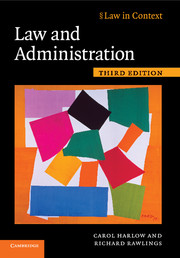Book contents
- Frontmatter
- Contents
- Preface
- Table of Cases
- Table of Statutes
- 1 Red and green light theories
- 2 The changing state
- 3 Transforming judicial review
- 4 Making the law
- 5 Rules and discretion
- 6 Regulation and governance
- 7 Regulatory design and accountability
- 8 Contractual revolution
- 9 Contract, contract, contract
- 10 Into the jungle: Complaints, grievances and disputes
- 11 Tribunals in transition
- 12 The Parliamentary Ombudsman: Firefighter or fire-watcher?
- 13 Inquiries: A costly placebo?
- 14 Continuity and change: Procedural review
- 15 Elite dimension: Court structures and process
- 16 Judicial review and administration: A tangled web
- 17 ‘Golden handshakes’: Liability and compensation
- Index
1 - Red and green light theories
Published online by Cambridge University Press: 05 June 2012
- Frontmatter
- Contents
- Preface
- Table of Cases
- Table of Statutes
- 1 Red and green light theories
- 2 The changing state
- 3 Transforming judicial review
- 4 Making the law
- 5 Rules and discretion
- 6 Regulation and governance
- 7 Regulatory design and accountability
- 8 Contractual revolution
- 9 Contract, contract, contract
- 10 Into the jungle: Complaints, grievances and disputes
- 11 Tribunals in transition
- 12 The Parliamentary Ombudsman: Firefighter or fire-watcher?
- 13 Inquiries: A costly placebo?
- 14 Continuity and change: Procedural review
- 15 Elite dimension: Court structures and process
- 16 Judicial review and administration: A tangled web
- 17 ‘Golden handshakes’: Liability and compensation
- Index
Summary
Law and state
Behind every theory of administrative law there lies a theory of the state. As Harold Laski once said, constitutional law is unintelligible except as the expression of an economic system of which it was designed to serve as a rampart. By this he meant that the machinery of government was an expression of the society in which it operated; one could not be understood except in the context of the other. In 1941, Sir Cecil Carr made a similar point in a series of lectures on administrative law given at Harvard University, in the course of which he said:
We nod approvingly today when someone tells us that, whereas the State used to be merely policeman, judge and protector, it has now become schoolmaster, doctor, house-builder, road-maker, town-planner, public utility supplier and all the rest of it. The contrast is no recent discovery. De Tocqueville observed in 1866 that the State ‘everywhere interferes more than it did; it regulates more undertakings, and undertakings of a lesser kind; and it gains a firmer footing every day, about, around and above all private persons, to assist, to advise, and to coerce them’ (Oeuvres, III, 501). Nassau William Senior, a Benthamite ten years older than Chadwick, a colleague of his on the original Poor Law Commission, had justified this tendency. A government, he thinks, must do whatever conduces to the welfare of the governed (the utilitarian theory); it will make mistakes, but non-interference may be an error too; one can be passively wrong as well as actively wrong. […]
- Type
- Chapter
- Information
- Law and Administration , pp. 1 - 48Publisher: Cambridge University PressPrint publication year: 2009



